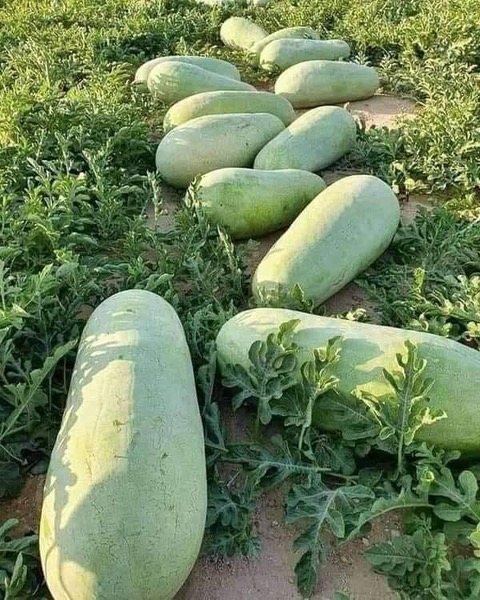
‘Food sovereignty is a watermelon for many Tunisians’
Six years after this conference, 25.3% of Tunisians were moderately or severely food insecure, compared to 18.1% in 2015; and 10.7% were severely food insecure, compared to 9.1% in 2015 (in 2021, this figure was estimated at 23.4% for all of Africa, compared to 1.5% in Europe and North America). And in late 2020, the Tunisian Seed Bank announced that 1,755 samples of originally Tunisian seeds had surfaced in Australia.
Another two years later, amid skyrocketing food prices due to climate change, violent conflict, the war in Ukraine, and the aftermath of COVID-19, international organizations published alarming reports of “rising hunger and a global food crisis.” Photos of empty supermarkets and endless queues outside bakeries circulated on Tunisian social media. With hardly any flour, milk, vegetable oil, rice, sugar, coffee and more – Tunisians ‘suddenly had a full-time job shopping’.
It is the fault of ‘speculators who created shortages to topple the government’, claims current President Kais Saied. Analysts, meanwhile, point to the country’s heavy import dependency and huge budget deficit. As emergency measures, the government moved to ban imports of non-essential products such as sugar, and made a favourable deal with Russia on wheat imports.
President Marzouki’s words from back then are now part of a discourse that feels logical and familiar. “Food sovereignty is no longer a choice for Tunisia, but a compelling necessity,” the major national daily La Presse recently concluded. “Today, with the global food crises, we see how much our country is depending on other countries and their trade policies.”
‘Food sovereignty is no longer a choice for Tunisia, but a compelling necessity’
Meanwhile, European leaders, sensitive to the unrest and protests against inflation, have drawn similar conclusions. The French and Italian governments changed the names of their ministries of Agriculture, Food and Forestry Resources to the ministries of Food Sovereignty, Agriculture and Forestry.
Although European leaders say that Europeans’ food security is not under threat – Europe is a net exporter of wheat, dairy and meat products – EU member states decided in 2022 to strengthen food security and reduce dependence on key imported agricultural products.
‘Watch out’, Tunisian economist Fadhel Kaboub recently blogged. ‘Know that “food security” is a dangerous neo-colonial technical concept designed to trap countries in the global South (a collective term for countries with lower incomes compared to countries in the global North) in high debts, to destroy their agriculture and environment, and increase their dependence on the global North.’

Yet food security is precisely what European policy is based on; see, for example, the ‘Farm to Fork strategy’, which is part of the European Green Deal, the path to a climate-neutral Europe in 2050. The concept was conceived in the 1970s by the FAO, the Food and Agriculture Organization of the UN, as ‘a guarantee that all people at all times have physical and economic access to sufficient, safe and good food that meets their nutritional needs’.
So for food security, it does not matter who produces what and where. As a result, Fadhel Kaboub and other critics argue, many countries have become dependent on international markets for their food supply. Don’t forget, they analyze, that the introduction of food security at the time went hand in hand with the further development of European agricultural subsidies. It was thought through very well: exploiting all possible trade advantages by subsidizing those products that a country can already produce relatively cheaply.
Consequence number one: European farmers, and later their Russian colleagues, were able to grow food at bargain prices and dump it in countries like Tunisia.
Consequence number two: millions of bankrupt farmers in Tunisia and other African countries. Demand for their grains, peas and other products suddenly stopped.
The real cause of the food crisis is ‘the way the food system is structured’, as concluded also by the Solidair platform recently. Such criticism of the food system is given substance in the pursuit of food sovereignty. It is based on the international right of populations, governments or communities to implement an agricultural policy that best meets their needs, without it having a negative impact on their environment.
Food sovereignty, for many Tunisians, is a watermelon. When they grew up, watermelons were different. Courgette-shaped, pistachio green, pink-red flesh. When you bit into one, you tasted the ‘delicious flavour of a real watermelon’. Nowadays, the markets only sell ‘American’ watermelons. They are oval-round and dark green with bright red flesh. Because they taste like ‘pesticides and medicines’ and you always have to go to the toilet afterwards, many people hate those ‘American poisonous fruits’.

‘Some people travel far and wide to buy ‘the good watermelons’’, tells farmer Naceur Bourquiba on the phone from Touza in Central Tunisia. ‘I have a good friend and colleague. He grows and sells American watermelons himself, but he only eats mine.’
On his land Bourquiba grows not only melons, but also apples, raspberries and vegetables, tomatoes, onions and peppers. Everything organic. He swore, as a matter of principle, to never use ‘the ‘sickening chemical rubbish’ – fertilizers, pesticides and imported hybrid seeds –, even though the circumstances, the location and Tunisian and international legislation are challenging.
He cultivates ‘solely for his own consumption or to give away to friends and acquaintances’, he explains. ‘I am retired and can afford it. Previously, I always had a job on the side. My organic products do not sell well on the market. Because of the small quantities, I have to charge very high prices. Sometimes two thirds of my harvest is lost due to pollution from surrounding factories and diseases. In order to get a decent yield, my colleagues use lots of chemical products, including pesticides that are banned in Europe. The government does not intervene. I never buy vegetables and fruit in the supermarket.’
The problems are not easy to solve, Naceur Bourquiba continues. ‘It’s a catch-22: either you go for as much harvest as possible and that way get – if you’re lucky – sufficient income, but you use unhealthy and environmentally destructive chemical rubbish, or you opt for health and nature conservation, and accept that you will never be able to make a living from it. Intervention is not an option for the government in these circumstances. Certainly not in a time when so many farmers are already going bankrupt due to the ongoing drought and the lack of irrigation water.’
Bourquiba investigated possibilities for export, but came up against the European standards for organic farming. ‘During tests and sampling, they will certainly find traces of pollution and chemical products. What do you want when there is a jeans factory right next door? The way I see it: the French are gone, but Tunisia is still colonised.’
And then he tells the story of Tunisian agriculture, which can serve as a model for many other former colonies. It began when the French rulers ‘modernized’ the agricultural system in the late 19th and early 20th centuries, expropriating land and water resources in order to increase production for export to France and the rest of the world. After independence in 1956, successive Tunisian governments consolidated this policy. Investments – for selected seeds, mechanization, imports of chemical fertilizers – went exclusively to large companies, pushing small farmers, i.e. the vast majority, to the margins. At a certain point, Tunisia, once the ‘breadbasket of Rome’, had to import grains. This contributed to the country’s enormous dependence on exports and led to serious financial problems in the late 1970s.
In the 1980s, international investors, led by the World Bank and the International Monetary Fund, came to the rescue, establishing themselves as new actors in Tunisia’s story. They demanded that the country industrialized, reduced government interference, and make more room for international trade. Free imports of hybrid seeds and pesticides would be necessary to boost agricultural production.
Taken together, the measures—cutting production subsidies, liberalizing farm prices, and changing the credit system—overturned Tunisia’s entire agricultural system, with serious consequences for the livelihoods of farming families, as researchers have found.
Taken together, the measures – cutting production subsidies, liberalising agricultural prices and changing the credit system – overturned the entire agricultural system in Tunisia
The hybrid seeds were like a Trojan horse, Bourquiba knows. ‘A pure tie-in. Together with the seeds, you have to buy pesticides from the same company. Hybrid seeds produce better harvests, but no new seeds can be extracted from them. And the companies own the patents, so you end up with the same supplier every year.’
Farmers also found that the improved seeds were not adapted to the climatic conditions in Tunisia. As a result, crops that were originally rain-fed, were lost and farmers became dependent on scarce and expensive irrigation water. Gradually, they lost the local seeds that they had passed down from generation to generation, and with them the local know-how that allowed them to select, multiply and preserve these seeds for years to come.
Mubarak Ben Naceur, director of the Tunisian Seed Bank, summed up the story of hybrid seeds in an interview with media platform Al Jazeera in 2020: ‘Plundering and smuggling of original samples of Tunisian seeds in exchange for flooding the market with hybrid seeds that may initially entice the farmer by increasing their yield, but have less nutritional value and are ultimately not cheap but expensive. This is still going on.’
The Food Barons study on market power in the agricultural sector, published in 2022 by the Canadian research agency ETC, shows that the Chinese seed company Chemchina & Sinochem (24.6%) and the German Bayer (16%) today together control 40% of the global seed market.
‘And have you found a solution yet?’, asks farmer Hedia Ayari, as we walk into her yard in Ariana, near Tunis, on a summer afternoon. She leads us across the bone-dry earth to the skinny cows, that are tied up with chains in a circle. ‘Last year we had to sell most of the cows. They cost more money than they brought in. Those animals eat so much. Due to rising grain prices, animal feed is almost impossible to obtain and unaffordable. Due to the drought, natural food no longer grows. No one wants cows in this situation, so we can hardly ask for anything for them. We used part of the proceeds to pay for a smuggling boat to take my son to Italy. There is no future here anymore.’
Faïrouz ben Salah is a freelance journalist and researcher who provides reports, analyses, columns and research for online media, print media, radio, think tanks and universities. Tunisia, Morocco, Algeria, Libya, Egypt and Sudan are among her areas of interest. Clients include: Trouw, NRC, De Groene, Vrij Nederland, MO* magazine, Wordt Vervolgd, NPO radio, VPRO Bureau Buitenland, VRT radio, Middle East Eye, The Tahrir Institute for Middle East Policy, Clingendael Institute and Wageningen University & Research.